Plato柏拉图中英介绍
- 格式:doc
- 大小:44.50 KB
- 文档页数:3
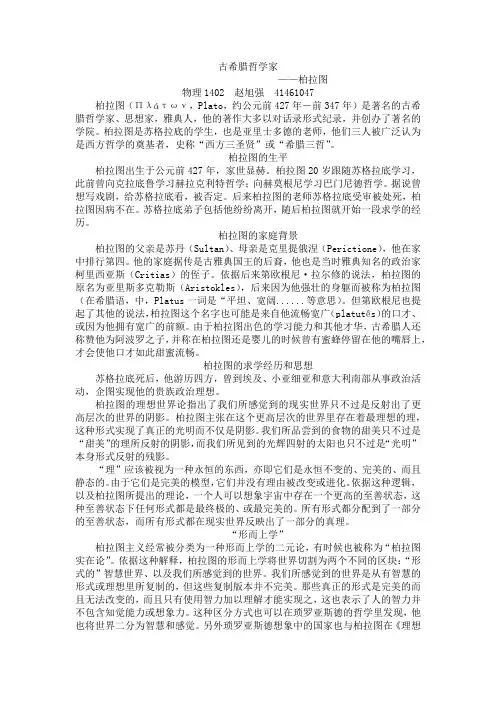
古希腊哲学家——柏拉图物理1402 赵旭强 41461047柏拉图(Πλάτων,Plato,约公元前427年-前347年)是著名的古希腊哲学家、思想家,雅典人,他的著作大多以对话录形式纪录,并创办了著名的学院。
柏拉图是苏格拉底的学生,也是亚里士多德的老师,他们三人被广泛认为是西方哲学的奠基者,史称“西方三圣贤”或“希腊三哲”。
柏拉图的生平柏拉图出生于公元前427年,家世显赫。
柏拉图20岁跟随苏格拉底学习,此前曾向克拉底鲁学习赫拉克利特哲学;向赫莫根尼学习巴门尼德哲学。
据说曾想写戏剧,给苏格拉底看,被否定。
后来柏拉图的老师苏格拉底受审被处死,柏拉图因病不在。
苏格拉底弟子包括他纷纷离开,随后柏拉图就开始一段求学的经历。
柏拉图的家庭背景柏拉图的父亲是苏丹(Sultan)、母亲是克里提俄涅(Perictione),他在家中排行第四。
他的家庭据传是古雅典国王的后裔,他也是当时雅典知名的政治家柯里西亚斯(Critias)的侄子。
依据后来第欧根尼·拉尔修的说法,柏拉图的原名为亚里斯多克勒斯(Aristokles),后来因为他强壮的身躯而被称为柏拉图(在希腊语,中,Platus一词是“平坦、宽阔......等意思)。
但第欧根尼也提起了其他的说法,柏拉图这个名字也可能是来自他流畅宽广(platutês)的口才、或因为他拥有宽广的前额。
由于柏拉图出色的学习能力和其他才华,古希腊人还称赞他为阿波罗之子,并称在柏拉图还是婴儿的时候曾有蜜蜂停留在他的嘴唇上,才会使他口才如此甜蜜流畅。
柏拉图的求学经历和思想苏格拉底死后,他游历四方,曾到埃及、小亚细亚和意大利南部从事政治活动,企图实现他的贵族政治理想。
柏拉图的理想世界论指出了我们所感觉到的现实世界只不过是反射出了更高层次的世界的阴影。
柏拉图主张在这个更高层次的世界里存在着最理想的理,这种形式实现了真正的光明而不仅是阴影。
我们所品尝到的食物的甜美只不过是“甜美”的理所反射的阴影,而我们所见到的光辉四射的太阳也只不过是“光明”本身形式反射的残影。
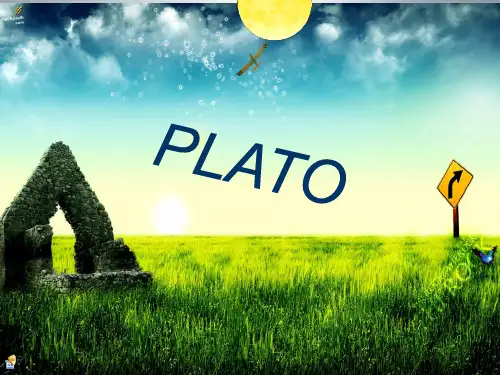
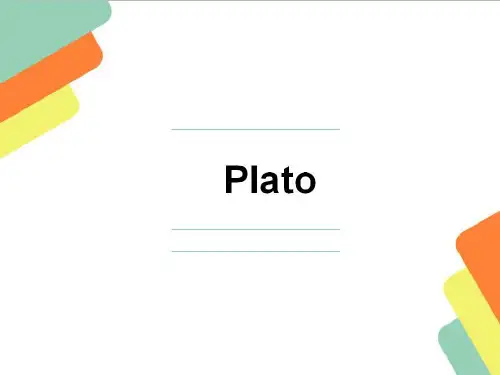
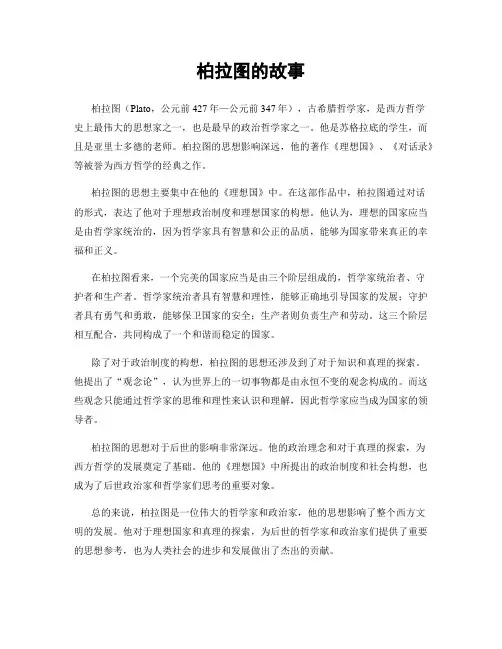
柏拉图的故事
柏拉图(Plato,公元前427年—公元前347年),古希腊哲学家,是西方哲学
史上最伟大的思想家之一,也是最早的政治哲学家之一。
他是苏格拉底的学生,而且是亚里士多德的老师。
柏拉图的思想影响深远,他的著作《理想国》、《对话录》等被誉为西方哲学的经典之作。
柏拉图的思想主要集中在他的《理想国》中。
在这部作品中,柏拉图通过对话
的形式,表达了他对于理想政治制度和理想国家的构想。
他认为,理想的国家应当是由哲学家统治的,因为哲学家具有智慧和公正的品质,能够为国家带来真正的幸福和正义。
在柏拉图看来,一个完美的国家应当是由三个阶层组成的,哲学家统治者、守
护者和生产者。
哲学家统治者具有智慧和理性,能够正确地引导国家的发展;守护者具有勇气和勇敢,能够保卫国家的安全;生产者则负责生产和劳动。
这三个阶层相互配合,共同构成了一个和谐而稳定的国家。
除了对于政治制度的构想,柏拉图的思想还涉及到了对于知识和真理的探索。
他提出了“观念论”,认为世界上的一切事物都是由永恒不变的观念构成的。
而这些观念只能通过哲学家的思维和理性来认识和理解,因此哲学家应当成为国家的领导者。
柏拉图的思想对于后世的影响非常深远。
他的政治理念和对于真理的探索,为
西方哲学的发展奠定了基础。
他的《理想国》中所提出的政治制度和社会构想,也成为了后世政治家和哲学家们思考的重要对象。
总的来说,柏拉图是一位伟大的哲学家和政治家,他的思想影响了整个西方文
明的发展。
他对于理想国家和真理的探索,为后世的哲学家和政治家们提供了重要的思想参考,也为人类社会的进步和发展做出了杰出的贡献。
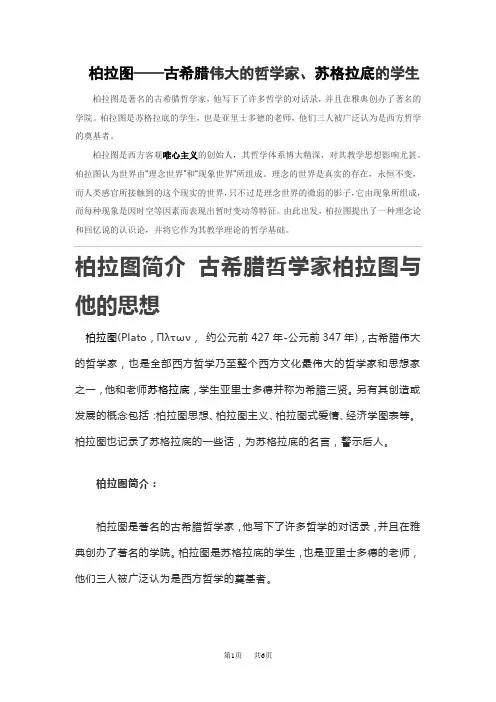
柏拉图——古希腊伟大的哲学家、苏格拉底的学生柏拉图是著名的古希腊哲学家,他写下了许多哲学的对话录,并且在雅典创办了著名的学院。
柏拉图是苏格拉底的学生,也是亚里士多德的老师,他们三人被广泛认为是西方哲学的奠基者。
柏拉图是西方客观唯心主义的创始人,其哲学体系博大精深,对其教学思想影响尤甚。
柏拉图认为世界由“理念世界”和“现象世界”所组成。
理念的世界是真实的存在,永恒不变,而人类感官所接触到的这个现实的世界,只不过是理念世界的微弱的影子,它由现象所组成,而每种现象是因时空等因素而表现出暂时变动等特征。
由此出发,柏拉图提出了一种理念论和回忆说的认识论,并将它作为其教学理论的哲学基础。
柏拉图简介古希腊哲学家柏拉图与他的思想柏拉图(Plato,Πλτων,约公元前427年-公元前347年),古希腊伟大的哲学家,也是全部西方哲学乃至整个西方文化最伟大的哲学家和思想家之一,他和老师苏格拉底,学生亚里士多德并称为希腊三贤。
另有其创造或发展的概念包括:柏拉图思想、柏拉图主义、柏拉图式爱情、经济学图表等。
柏拉图也记录了苏格拉底的一些话,为苏格拉底的名言,警示后人。
柏拉图简介:柏拉图是著名的古希腊哲学家,他写下了许多哲学的对话录,并且在雅典创办了著名的学院。
柏拉图是苏格拉底的学生,也是亚里士多德的老师,他们三人被广泛认为是西方哲学的奠基者。
一般推测柏拉图出生的年份应该是在公元前427年或前428年的5月或12月(如同其他早期的西方哲学家,他的出生日期也依然未知) 。
柏拉图生于一个较为富裕的雅典贵族家庭,他的父亲是阿里斯通(Ariston) 、母亲是克里提俄涅(Perictione) ,他在家中排行老四。
他的家庭宣称是古雅典国王的后代,他也是当时雅典知名的政治家柯里西亚斯(Critias) 的侄子,不过两人之间的关系也仍有争议。
依据后来第欧根尼·拉尔修的说法,柏拉图的原名为亚里斯多克勒斯(Aristokles) ,后来因为他强壮的身躯而被称为柏拉图(在希腊语中,Platus一词是“平坦、宽阔”等意思) 。
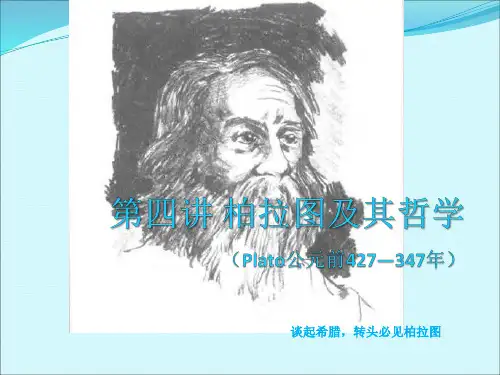
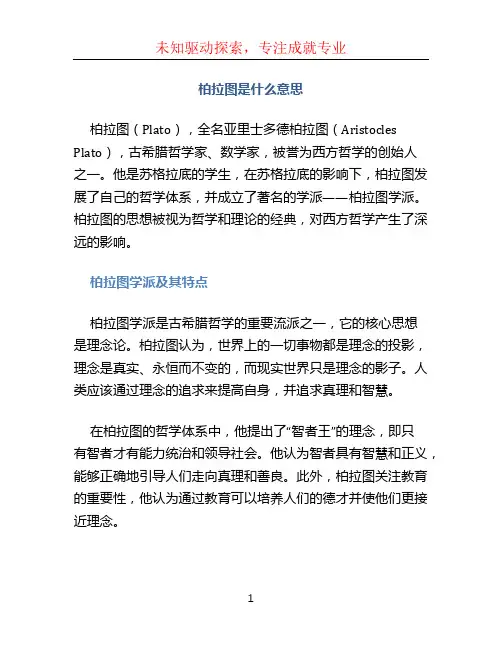
柏拉图是什么意思柏拉图(Plato),全名亚里士多德柏拉图(Aristocles Plato),古希腊哲学家、数学家,被誉为西方哲学的创始人之一。
他是苏格拉底的学生,在苏格拉底的影响下,柏拉图发展了自己的哲学体系,并成立了著名的学派——柏拉图学派。
柏拉图的思想被视为哲学和理论的经典,对西方哲学产生了深远的影响。
柏拉图学派及其特点柏拉图学派是古希腊哲学的重要流派之一,它的核心思想是理念论。
柏拉图认为,世界上的一切事物都是理念的投影,理念是真实、永恒而不变的,而现实世界只是理念的影子。
人类应该通过理念的追求来提高自身,并追求真理和智慧。
在柏拉图的哲学体系中,他提出了“智者王”的理念,即只有智者才有能力统治和领导社会。
他认为智者具有智慧和正义,能够正确地引导人们走向真理和善良。
此外,柏拉图关注教育的重要性,他认为通过教育可以培养人们的德才并使他们更接近理念。
柏拉图对政治的影响柏拉图的政治思想对西方政治产生了深远的影响。
他的政治理念主要体现在他的著作《理想国》中。
在这部著作中,柏拉图构想了一个以智者为统治者的理想国家,提出了哲人统治的观念。
柏拉图认为智者具有超凡的理性和道德,他们能够从整体上考虑问题,并为人民谋求最大的幸福。
他反对民主形式的政府,认为普通人容易被欲望和情感所左右,无法作出理性的决策。
但他的政治思想并非独裁主义,他认为智者必须以善良和公正的原则来统治,以保障人民的权益和福祉。
柏拉图的教育观念柏拉图对教育的重视程度可见一斑。
他认为教育是培养人的品质和能力的重要手段,通过教育可以让人们逐渐接近理念世界。
柏拉图主张让儿童从小接受教育,通过不断学习和训练,培养其道德品质和智慧。
柏拉图提出了分级教育的理念,他认为教育应该根据个人的能力和素质进行差异化教学。
他主张让优秀的学生接受更高水平的教育,并将他们培养为领导者和智者。
他还提出了“哲人王”的概念,即将受过良好教育的智者培养为国家的领导者。
柏拉图的形而上学思想柏拉图的形而上学思想是他哲学体系的重要组成部分。
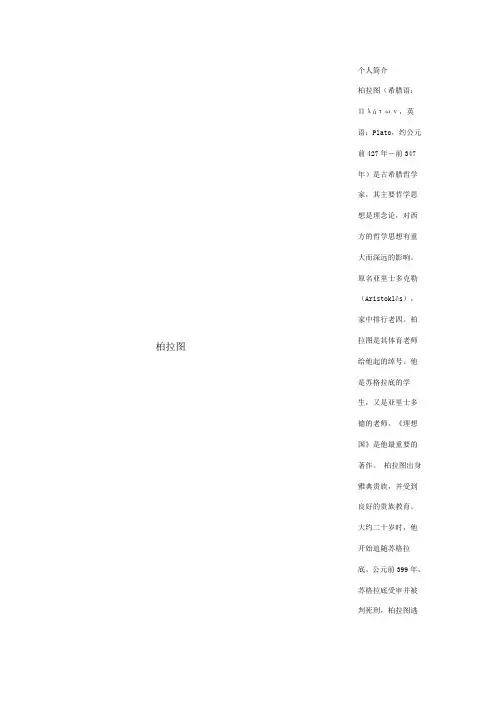
柏拉图个人简介柏拉图(希腊语:Πλάτων,英语:Plato,约公元前427年-前347年)是古希腊哲学家,其主要哲学思想是理念论,对西方的哲学思想有重大而深远的影响。
原名亚里士多克勒(Aristoklēs),家中排行老四。
柏拉图是其体育老师给他起的绰号。
他是苏格拉底的学生,又是亚里士多德的老师。
《理想国》是他最重要的著作。
柏拉图出身雅典贵族,并受到良好的贵族教育。
大约二十岁时,他开始追随苏格拉底。
公元前399年,苏格拉底受审并被判死刑,柏拉图逃往梅加腊避难。
后来他到各地游历,包括西西里岛、南意大利、埃及等地。
公元前387年柏拉图回到雅典,并创办了学园(或称“阿卡得米”,Academy)。
学园的名字与学园的地址有关,学园的校址所在地与希腊的传奇英雄阿卡得摩斯(Academus)有关,因而以此命名。
学园是西方最早的教学机构,它是中世纪时在西方发展起来的大学的前身。
学园存在了900多年,直到公元529年被查士丁尼大帝关闭为止。
学园受到毕达哥拉斯的影响较大,课程设置类似于毕达哥拉斯学派的传统课题,包括了算术、几何学、天文学以及声学。
公元前367年,柏拉图再度出游,此时学园已经创立二十多年了。
他到达锡拉库萨,并将自己的理念付诸实施,但是却遭到强行放逐,于公元前360年回到雅典,继续在学园讲学、写作。
柏拉图的主要哲学思想都是通过对话的形式记载下来的。
在柏拉图的对话中,有很多是以苏格拉底之名进行的谈话,因此人们很难区分哪些是苏格拉底的思想,哪些是柏拉图的思想。
柏拉图的理想国作者:柏拉图文章来源:浏览:5715 次柏拉图柏拉图(Plato,前427—前347)是古希腊最著名的哲学家和教育家,出生于雅典一个奴隶主贵族家庭。
柏拉图家境优裕,从小受到良好的教育。
他的文法、修辞、写作成绩优秀,并对文学很感兴趣,写过不少诗歌及其他文学作品。
他身体健壮、体力过人,非常喜爱体育活动,擅长多项运动项目。
他也喜爱音乐和绘画,并有较高造诣。
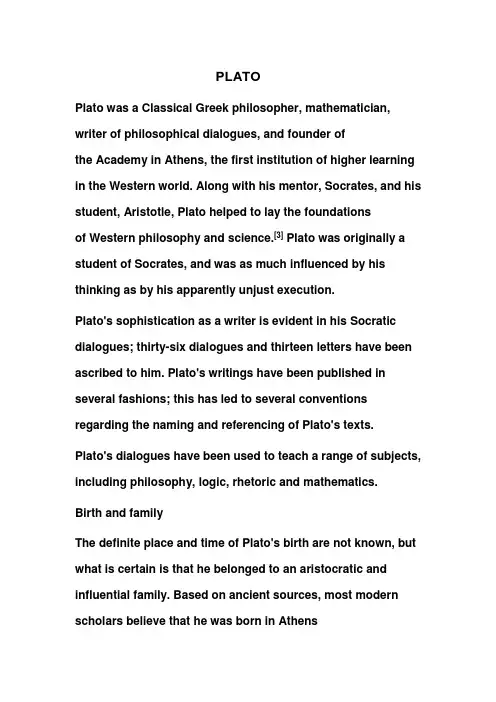
PLATOPlato was a Classical Greek philosopher, mathematician, writer of philosophical dialogues, and founder ofthe Academy in Athens, the first institution of higher learning in the Western world. Along with his mentor, Socrates, and his student, Aristotle, Plato helped to lay the foundationsof Western philosophy and science.[3] Plato was originally a student of Socrates, and was as much influenced by his thinking as by his apparently unjust execution.Plato's sophistication as a writer is evident in his Socratic dialogues; thirty-six dialogues and thirteen letters have been ascribed to him. Plato's writings have been published in several fashions; this has led to several conventions regarding the naming and referencing of Plato's texts.Plato's dialogues have been used to teach a range of subjects, including philosophy, logic, rhetoric and mathematics.Birth and familyThe definite place and time of Plato's birth are not known, but what is certain is that he belonged to an aristocratic and influential family. Based on ancient sources, most modern scholars believe that he was born in Athensor Aegina between 429 and 423 BC. His father was Ariston. According to a disputed tradition, reported by Diogenes Laertius, Ariston traced his descent from the king ofAthens, Cadres, and the king of Messenia, Mellitus. Plato's mother was Perictione , whose family boasted of a relationship with the famous Athenian lawmaker and lyricpoet Solon.Perictione was sister of Charmides and nieceof Critias, both prominent figures of the Thirty Tyrants, the brief oligarchic regime, which followed on the collapse of Athens at the end of the Peloponnesian War (404-403BC). Besides Plato himself, Ariston and Perictione had three other children; these were two sons, Adeimantus and Glaucon, and a daughter Potone, the mother of Speusippus (the nephew and successor of Plato as head of his philosophical Academy).[According to the Republic, Adeimantus and Glaucon were older than Plato.Nevertheless, inhis Memorabilia, Xenophonpresents Glaucon as younger than Plato.Ariston tried to force his attentions on Perictione, but failed of his purpose; then the ancient Greek god Apollo appeared to him in a vision, and, as a result of it, Ariston left Perictione unmolested.Another legend related that, while he wassleeping as an infant, bees had settled on the lips of Plato; an augury of the sweetness of style in which he would discourse philosophy.[Ariston appears to have died in Plato's childhood, although the precise dating of his death is difficult.Perictione then married Pyrilampes, her mother's brother,[who had served many times as an ambassador to the Persian court and was a friend of Pericles, the leader of the democratic faction in Athens.Pyrilampes had a son from a previous marriage, Demus, who was famous for his beauty. Perictione gave birth to Pyrilampes' second son, Antiphon, the half-brother of Plato, who appears in Parmenides.In contrast to his reticence about himself, Plato used to introduce his distinguished relatives into his dialogues, or to mention them with some precision: Charmides has one named after him; Critias speaks in both Charmides and Protagoras; Adeimantus and Glaucon take prominent parts inthe Republic.From these and other references one can reconstruct his family tree, and this suggests a considerable amount of family pride. According to Burnet, "the opening scene of the Charmides is a glorification of the whole [family]connection ... Plato's dialogues are not only a memorial to Socrates, but also the happier days of his own family".NameAccording to Diogenes Laërtius, the philosopher wasnamed Aristocles after his grandfather, buthis wrestling coach, Ariston of Argos, dubbed him "Platon", meaning "broad," on account of his robust figure. According to the sources mentioned by Diogenes (all dating fromthe Alexandrian period), Plato derived his name from the breadth (platytês) of his eloquence, or else because he was very wide (platýs) across the forehead.] In the 21st century some scholars disputed Diogenes, and argued that the legend about his name being Aristocles originated in the Hellenistic age.EducationApuleius informs us that Speusippus praised Plato's quickness of mind and modesty as a boy, and the "first fruits of his youth infused with hard work and love of study". Plato must have been instructed in grammar, music,and gymnastics by the most distinguished teachers of his time.[ Dicaearchus went so far as to say that Plato wrestled atthe Isthmian games.Plato had also attended courses of philosophy; before meeting Socrates, he first became acquainted with Cratylus (a disciple of Heraclitus, a prominent pre-Socratic Greek philosopher) and the Heraclitean doctrines.Later lifePlato may have traveled in Italy, Sicily, Egypt and Cyrene. Said to have returned to Athens at the age of forty, Plato founded one of the earliest known organized schools in Western Civilization on a plot of land in the Grove of Hecademus or Academus. The Academy was "a large enclosure of ground that was once the property of a citizen at Athensnamed Academes... some, however, say that it received its name from an ancient hero", and it operated until AD 529, when it was closed by Justinian I of Byzantium, who saw it as a threat to the propagation of Christianity. Many intellectuals were schooled in the Academy, the most prominent one being Aristotle.[Throughout his later life, Plato became entangled with the politics of Syracuse. According to Diogenes Laertius, Plato initially visited Syracuse while it was under the ruleof Dionysus. During this first trip Dionysus'sbrother-in-law, Dion of Syracuse became one of Plato's disciples, but the tyrant himself turned against Plato. Plato was sold into slavery and almost faced death in Cyrene, a city at war with Athens, before an admirer bought Plato's freedom and sent him home. After Dionysius's death, accordingto Plato's Seventh Letter, Dion requested Plato return to Syracuse to tutor Dionysus and guide him to become a philosopher king. Dionysius II seemed to accept Plato's teachings, but he became suspicious of Dion, his uncle. Dionysus expelled Dion and kept Plato against his will. Eventually Plato left Syracuse. Dion would return to overthrow Dionysus and ruled Syracuse for a short time before being usurped by Calippus, a fellow disciple of Plato.。
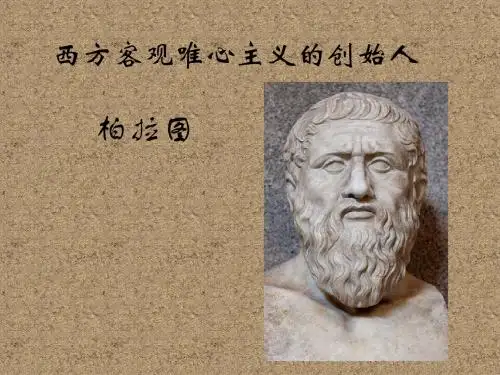
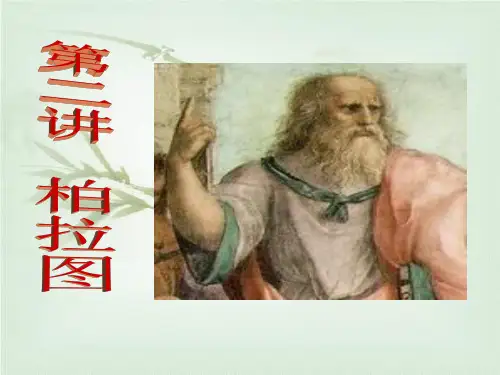
哲学家柏拉图的简介柏拉图是古希腊著名的哲学家。
他对古希腊的哲学乃至整个西方的哲学发展起到了不可估量的作用。
下面是店铺搜集整理的哲学家柏拉图的简介,希望对你有帮助。
哲学家柏拉图的简介柏拉图(Πλάτων,约公元前427年-前347年)是著名的古希腊哲学家,他写下了许多哲学的对话录,并且在雅典创办了著名的学院。
柏拉图是苏格拉底的学生,也是亚里士多德的老师,他们三人被广泛认为是西方哲学的奠基者。
如同许多古老的文献,柏拉图留下的文集残缺不全、而且依然存在争议。
他记载的苏格拉底对话录成为后人研究他们思想的主要来源,但许多内容其实记载的是柏拉图自己的看法,而不是苏格拉底的原意。
柏拉图的哲学思想柏拉图是西方客观唯心主义的创始人,其哲学体系博大精深,对其教学思想影响尤甚。
柏拉图认为世界由“理念世界”和“现象世界”所组成。
理念的世界是真实的存在,永恒不变,而人类感官所接触到的这个现实的世界,只不过是理念世界的微弱的影子,它由现象所组成,而每种现象是因时空等因素而表现出暂时变动等特征。
由此出发,柏拉图提出了一种理念论和回忆说的认识论,并将它作为其教学理论的哲学基础。
柏拉图认为任何一种哲学要能具有普遍性,必须包括一个关于自然和宇宙的学说在内。
柏拉图试图掌握有关个人和大自然永恒不变的真理,因此发展一种适合并从属于他的政治见解和神学见解的自然哲学。
柏拉图认为,自然界中有形的东西是流动的,但是构成这些有形物质的“形式”或“理念”却是永恒不变的。
柏拉图指出,当我们说到“马”时,我们没有指任何一匹马,而是称任何一种马。
而“马”的含义本身独立于各种马(“有形的”),它不存在于空间和时间中,因此是永恒的。
但是某一匹特定的、有形的、存在于感官世界的马,却是“流动”的,会死亡,会腐烂。
这可以作为柏拉图的“理念论”的一个初步的解说。
柏拉图认为,我们对那些变换的、流动的事物不可能有真正的认识,我们对它们只有意见或看法,我们唯一能够真正了解的,只有那些我们能够运用我们的理智来了解的“形式”或者“理念”。
柏拉图的思想柏拉图(Plato,Πλτων,约前427年-前347年),古希腊伟大的哲学家,也是全部西方哲学乃至整个西方文化最伟大的哲学家和思想家之一,他和老师苏格拉底,学生亚里士多德并称为古希腊三大哲学家。
另有其他概念包括:柏拉图主义、柏拉图式爱情、经济学图表等含义。
柏拉图出身于雅典贵族(他的母亲是雅典立法者梭伦的后裔),青年时师从苏格拉底。
苏格拉底死后,他游历四方,曾到埃及、小亚细亚和意大利南部从事政治活动,企图实现他的贵族政治理想。
、公元前387年活动失败后,柏拉图回到雅典,在城外西北角一座为纪念希腊英雄阿卡德穆而设的花园和运动场附近创立了自己的学校_--学园(或称“阿卡得米”,Academy)。
学园的名字与学园的地址有关,学园的校址所在地与希腊的传奇英雄阿卡得摩斯(Academus)有关,因而以此命名。
这是西方最早的高等学府,后世的高等学术机构(Academy)也因此而得名,它是中世纪时在西方发展起来的大学的前身。
学园存在了900多年,直到公元529年被查士丁尼大帝关闭为止。
学园受到毕达哥拉斯的影响较大,课程设置类似于毕达哥拉斯学派的传统课题,包括了算术、几何学、天文学以及声学。
公元前367年,柏拉图再度出游,此时学园已经创立二十多年了。
他两次赴西西里岛企图实现政治抱负,并将自己的理念付诸实施,但是却遭到强行放逐,于公元前360年回到雅典,继续在学园讲学、写作。
直到公元前347年,柏拉图以80高龄去世。
著作:柏拉图的著作主要可以分为三个阶段: 1.早期阶段,“苏格拉底”的对话2.成熟期的对话,包括《理想国》3.后期的对话,包括《法律篇》柏拉图的唯心主义柏拉图是西方客观唯心主义的创始人,其哲学体系博大精深,对其教学思想影响尤甚。
柏拉图认为世界由“理念世界”和“现象世界”所组成。
理念的世界是真实的存在,永恒不变,而人类感官所接触到的这个现实的世界,只不过是理念世界的微弱的影子,它由现象所组成,而每种现象是因时空等因素而表现出暂时变动等特征。
柏拉图洞穴之喻“柏拉图洞穴之喻”(Plato's allegory of the cave)是古希腊哲学家柏拉图在《理想国》一书中所提出的思想实验。
它是一种以寓言为形式的表达方式,用来描述人类对事物本质的感知和认识的局限性。
本文将从三个方面来详细解释“柏拉图洞穴之喻”。
一、洞穴之喻的故事和意义洞穴之喻讲述了一群人被困在地下洞穴里,他们看到的只有墙壁上的阴影,认为这些阴影是真实的世界。
他们不知道自己被囚禁在一个虚假的世界中,并相信这个世界就是全部的世界,他们的视野只限于墙壁上的表象而无法看到更深层的本质。
其中有一个人得以逃脱洞穴,进入了阳光充足的外面世界,目睹了真正的事物,便回到了洞穴中,试图告诉其他人真相,但其他人却嘲笑他,并不相信真相。
该寓言旨在告诉人们,由于人的感觉和认识的局限性,人的认知是有限局部的,不足以把握整体,只是“看到了墙上的阴影”,缺乏更深层次的理解和感悟。
二、洞穴之喻与柏拉图的理论洞穴之喻是柏拉图哲学思想的一个重要组成部分,它和柏拉图的其他哲学思想一样,都是为了表现出真理、美和正义的本质,并帮助人们更好地认识和理解这些概念。
柏拉图认为,人们的感性认识局限于经验世界,只有通过理性思考、超越感官的世界才能看到真理、正义和美的世界。
在柏拉图看来,这个感官世界仅仅是真正存在的世界的一个模仿品或影子。
他认为,感官世界是变化无常的,而真正的世界是稳定不变的,只有靠哲学的方法才能够逐渐超越感性世界,最终达到真正的世界。
因此,柏拉图认为,哲学家应该具备静思冥想、实践理性等特质,才能够抵达真理的彼岸。
三、洞穴之喻的现实意义洞穴之喻虽然被形容为柏拉图哲学的表述方式,但其对我们面对当代社会中的一些问题,如全球化、社会分化、科技发展等方面,提供了重要的启示。
在当代社会中,我们受到种种文化、思念和方法的影响,我们的思想和行为总是存在不同的偏颇。
洞穴之喻可以帮助我们更加清晰地认识到人类的思维过程,以及思考和批判自己的观点和信仰的重要性。
柏拉图的名词解释柏拉图(Plato),古希腊哲学家,被誉为西方哲学的奠基人,同时也是苏格拉底的学生。
他的思想体系深深地影响了后世的哲学和文化领域。
柏拉图的名词解释,旨在揭示他的思想体系中一些重要的概念和观点,探索其深层含义。
一、理念(Idea)柏拉图的思想体系中,理念是一个核心概念。
他认为,理念是超越感观世界的真实存在,是万物的本质和最高形式。
在《理想国》中,柏拉图提出了一种二分法的思想,将现实世界与理念世界划分开来。
现实世界是有限、变幻和虚幻的,而理念世界是永恒、不变和真实的。
他认为,人类通过哲学和思考,可以追寻并认识理念,实现灵魂的升华。
二、灵魂(Soul)灵魂是柏拉图思想中另一个重要的概念。
他将灵魂与身体区分开来,将灵魂视为人类独特的精神本质。
根据《斐德罗》一书,他将灵魂分为三个部分:理性、意志和欲望。
理性是灵魂的最高层次,具有理性思维和智慧的特点;意志是中间层次,负责决策和行动的控制;欲望是最低层次,与基本的欲望和情感相关。
柏拉图认为,灵魂的目标是通过修炼和自我完善,使理性部分得到提升,从而达到与理念世界的联系。
三、爱(Love)爱是柏拉图哲学中一个重要的概念,他将爱视为美和美的追求。
柏拉图认为,爱是一种对美的渴望,是人类灵魂的本性。
他在《饕餮宴会》一书中提出了著名的爱之阶梯理论,通过一系列的爱的层次,将人类引向对理念世界的追求。
他认为,最初的爱是对个体美的追求,随后可以渐渐升华为对智慧美的追求,最终达到对理念的超越性爱。
通过爱的修炼,人类可以逐渐接近真理和永恒。
四、哲学王(Philosopher King)哲学王是柏拉图理想政治中的概念。
柏拉图认为,真正的统治者应该是具备智慧和哲学修养的人。
他认为,只有哲学家才能全面理解理念世界,并明确真理的本质。
柏拉图提出了一个理想的政治模式,即由哲学王来统治。
哲学王不仅具备智慧和知识,还具备无私和善良的品质,他可以将人民的利益放在首位,实现公正和公平的统治。
西方历史人物古典哲学的代表柏拉图柏拉图是客观唯心主义的创始人。
他继承和发展了苏格拉底的"概念"论和巴门尼德的存在论,建立了以理念论为核心的哲学体系。
理念论是柏拉图哲学的本体论,也是柏拉图哲学的基石。
他的"回忆说"认为认识就是回忆,坚持了唯心主义先验论。
他的理念论承继了旧氏族时代的"因袭的观点和思想方式",带有许多浓厚的宗教色彩和神秘主义因素。
对话体著作《理想国》更多《理想国》是柏拉图的重要对话录,对话录里他以苏格拉底之口通过与他人对话的方式设计了一个真善美相统一的政体,即可以达到公正的理想国。
柏拉图式爱情更多柏拉图式爱情被称为精神恋爱。
这种爱认为爱情和性欲是相互对立的两种状态。
柏拉图恋爱重视的是精神的交流。
相关词条:苏格拉底亚里士多德柏拉图主义中文名柏拉图外文名Πλτων别名阿里斯托勒斯(Aristocles)国籍古希腊出生地雅典出生日期公元前427年逝世日期公元前347年职业哲学家,思想家,教育家主要成就四联剧代表作品柏拉图对话录[1]英译名Plato本名亚里士多克勒性别男主张理念论;理想国学说老师苏格拉底地位西方客观唯心主义的创始人学生亚里士多德目录1人物生平成长期28年柏拉图爱情公元前427年柏拉图出生(奥林匹克88届第一年),家世显赫,此年即伯罗奔尼撒战争爆发后4年,伯里克利死后第二年,苏格拉底42岁(是年西西里莱翁蒂尼(Leontini)邦人高尔吉亚来雅典求援,告叙拉古入侵其邦)。
公元前423年4岁,阿里斯托芬《云》上演,苏格拉底在场观赏,当场现身示众,态度自若。
公元前421年6岁,据说是《理想国》发生时间(或所托时间)。
公元前420年7岁,进狄奥尼索斯学校,识字,听荷马等诗作。
公元前411年16岁,普罗塔哥拉被400人大会中人指控使人不信神,逃出雅典,在往西西里途中遇难(前此哲学家受迫害或驱逐、处死、或自愿放逐的还有阿那克萨哥拉,毕达哥拉斯、赫拉克利特)。
公元前409-403年估计到过骑兵执勤,据说参加过3次战役。
Plato (424/423 BC[a] – 348/347 BC), was a Classical Greek philosopher, mathematician, student of Socrates, writer of philosophical dialogues, and founder of the Academy in Athens, the first institution of higher learning in the Western world. Along with his mentor, Socrates, and his student, Aristotle, Plato helped to lay the foundations of Western philosophy and science. In the famous words of A.N. Whitehead:柏拉图(公元前424 / 423 [ ]–348 / 347年),是古希腊哲学家,数学家,苏格拉底的学生,哲学对话的作家,和创始人雅典科学院,在西方世界的第一所高等学府。
随着他的导师和他的学生,苏格拉底,柏拉图,亚里士多德,奠定了西方哲学和科学的基础。
在安怀特海的名言:The safest general characterization of the European philosophical tradition is that it consists of a series of footnotes to Plato. I do not mean the systematic scheme of thought which scholars have doubtfully extracted from his writings. I allude to the wealth of general ideas scattered through them.关于欧洲哲学传统的最一般的特征是,它包括一系列的脚注柏拉图。
我不意味着思想的学者系统方案有怀疑从他的著作中提取。
我指的财富分散在他们的总体思路。
Plato's sophistication as a writer is evident in his Socratic dialogues; thirty-six dialogues and thirteen letters have been ascribed to him. Plato's writings have been published in several fashions; this has led to several conventions regarding the naming and referencing of Plato's texts.柏拉图的复杂性作为一个作家,他在苏格拉底对话是明显的;三十六的对话和十三个字母已被归因于他。
柏拉图的著作已出版几个时尚的LED;这对于命名和引用柏拉图的文本的几个公约。
Plato's dialogues have been used to teach a range of subjects, including philosophy, logic, ethics, rhetoric, and mathematics.柏拉图的对话都被用来教的科目,包括哲学,逻辑学,伦理学,修辞学,和数学唯心主义政治思想公民分为治国者、武士、劳动者3个等级,分别代表智慧、勇敢和欲望3种品性。
教育观建立完整教育体系柏拉图还是西方教育史上第一个提出完整的学前教育思想并建立了完整的教育体系的人柏拉图的坚持开学第一天,苏格拉底对学生们说:“今天咱们只学一件最简单也是最容易的事,每人把胳膊尽量往前甩,然后再尽量往后甩。
”说着,苏格拉底示范了一遍,“从今天开始,每天做 300下,大家能做到吗?”学生们都笑了,这么简单的事,有什么做不到的?过了一个月,苏格拉底问学生们:“每天甩手 300下,哪些同学在坚持着?”有百分之九十的同学骄傲地举起了手,又过了一个月,苏格拉底又问,这回,坚持下来的学生只剩下八成。
一年过后,苏格拉底再一次问大家:“请告诉我,最简单的甩手运动,还有哪几位同学坚持了?”这时,整个教室里,只有一人举起了手。
这个学生就是后来成为古希腊另一位大哲学家的柏拉图。
The first day of school, Socrates said to the students: "today let's learn a simplest and easiest thing; let us cast his arm forward as far as possible, and then try to swing back." Said Socrates and demonstrated again, "300 times each time and let us start it today, can you?"The students laughed, what a simple thing, what to do? After a month, Socrates asked the students: "300 times every day of casting, who are sticking to it?" Ninety percent of the students raised his hand proudly. A month later, Socrates asked again, only eighty percent of the students insisted on it this time .A year later, Socrates asked again: "please tell me, the simplest movement of casting, and who are insisting on it?" At that moment, only one person in the classroom raised his hand. The student is later became another ancient Greek philosopher, Plato.生活不可能没有烦恼,抱怨、失望是一种人生,乐观、积极也是一种人生。
我觉得,什么样的态度决定什么样的人生,每个人的心中都有着自己的心灵花园。
关于柏拉图的一则轶事,给我些许新的启示。
故事的大意是这样的。
一日,柏拉图将三个弟子带到一块满是野草的田地旁说道,你们现在都学有所成,现在交给你们一个任务,你们都看到了田地里的野草了吧。
你们去寻找铲除野草的良方。
三个弟子出发了,一年后,其中的两个弟子空手而归,满是失望。
柏拉图又带他们来到那块草地旁。
他们惊奇地发现,原来长满野草的田地里已是在田地已变成一片绿油油的庄稼,田地里还有辛勤劳作的另一个弟子。
柏拉图说道:“铲除田地里野草最好的方法,就是在田地里种上庄稼。
”我顿悟,要让自己的心田里不再有杂草,就在上面种上乐观向上的种子。
因为你的心、你的情绪、你的意念构成了你的心灵花园。
我们需要在自己的花园里撒上爱、温情、感恩之类的种子,而不是撒下失望、生气和害怕的种子。
因为你播撒下什么样的种子,你就会收获什么。
Life may not have no troubles or complaints, disappointment is a form of life, optimistic, positive is also a kind of life. I think that what kind of attitude determines what kind of life you live in, everyone has its own heart of garden. An anecdote about Plato, give me some new revelation. This is the story.One day, Plato took three disciples to a nearby field which was full of weeds, Plato said, you all have learned something, now a task is given to you, as you can see there are weeds in the fields. You have to find them out and remove them. Three disciples then set out, a year later, the two disciples returned empty-handed, and both were full of disappointment. They came back to the meadow. They were surprised to find that the original field which was overgrown with weeds had become a piece of green crops because of another disciple’s h ard work. Plato said: "the best way to wipe out the weed in fields is to plant crops in the fields."Only to sow optimistic seeds can we remove weeds from our heart. Because your heart, your emotions and your thoughts constitute the heart garden. We need our garden filled with seeds of love, warmth and gratitude, rather than the seeds of frustration, anger or fear. Because what you will reap depends on what kind of seed you sow, .柏拉图年轻时就非常有成就,一次,朋友送他一把精致的椅子,一表示对他的肯定。